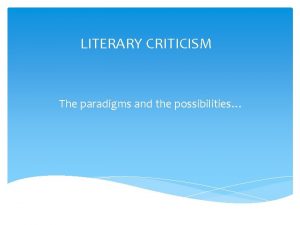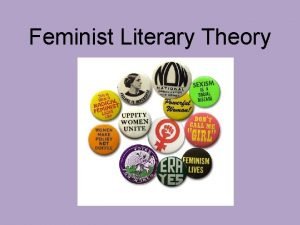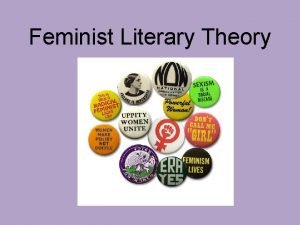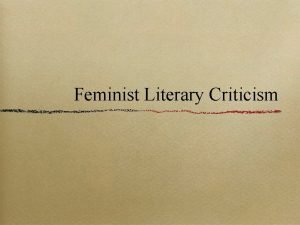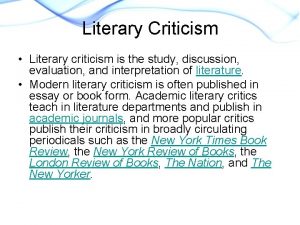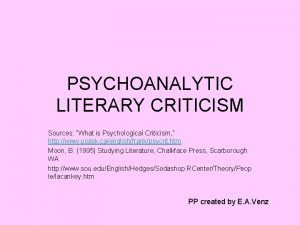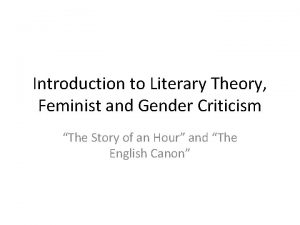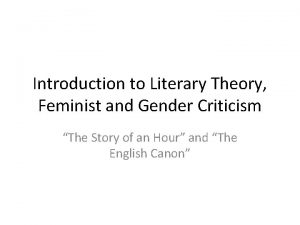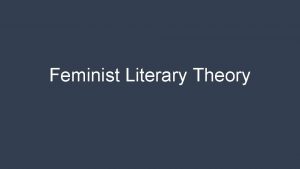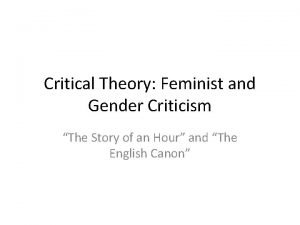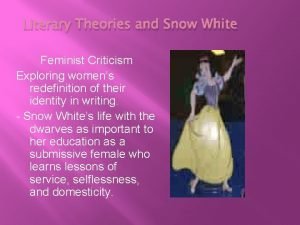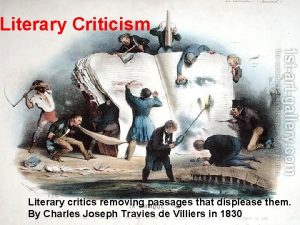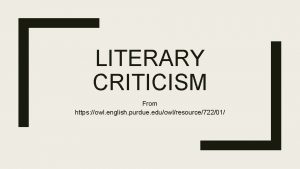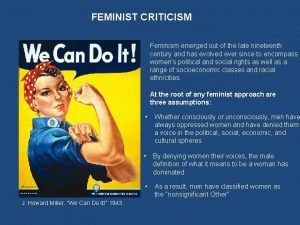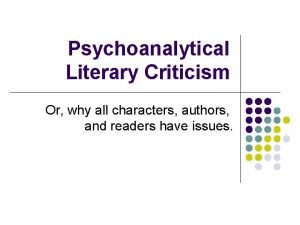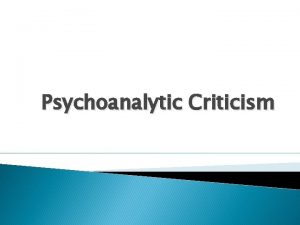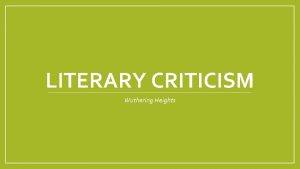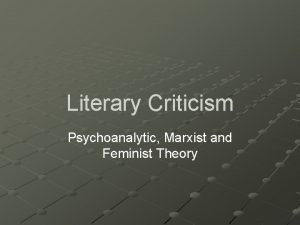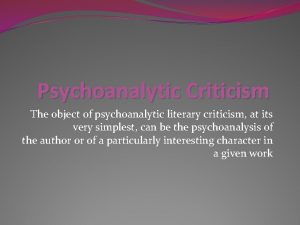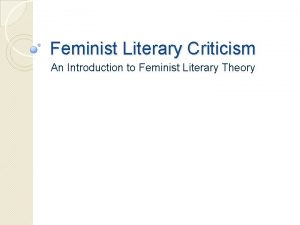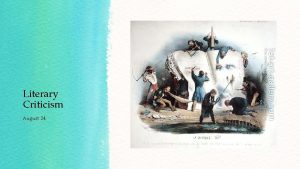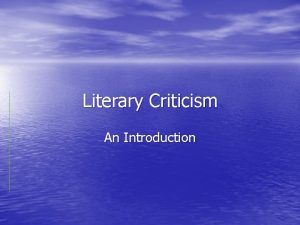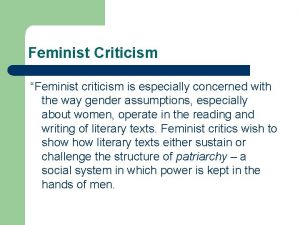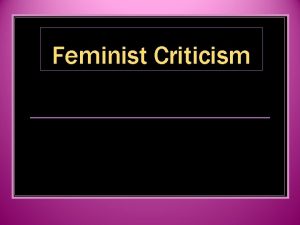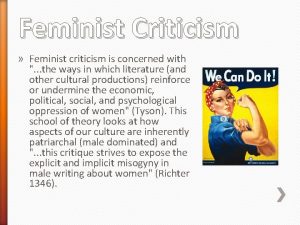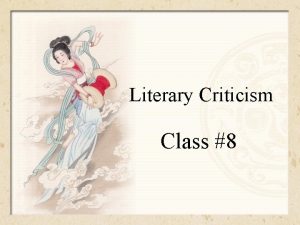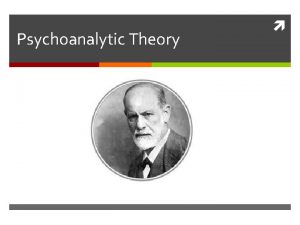Psychoanalytic Literary Criticism With A Feminist Analysis Criticism















- Slides: 15

Psychoanalytic Literary Criticism With A Feminist Analysis Criticism #4

Feminism in Brave New World Before we go any further, it is time for a review.

Review: What to Look For In Literature: How is the relationship between men and women portrayed? What are the power relationships between men and women (or characters assuming male/female roles)? How are male and female roles defined? What constitutes masculinity and femininity? How do characters embody these traits? Do characters take on traits from opposite genders? How so? How does this change others’ reactions to them? What does the work reveal about the operations (economically, politically, socially, or psychologically) of patriarchy?

Feminist Literary Criticism Review Continued… What does the work imply about the possibilities of sisterhood as a mode of resisting patriarchy? What does the work say about women's creativity? What does the history of the work's reception by the public and by the critics tell us about the operation of patriarchy? What role the work play in terms of women's literary history and literary tradition?

Doing a Feminist Critique I suggest you choose 2 or 3 questions from the previous list and ask those questions of characters in Brave New World. Ex. What are the power relationships between men and women (or characters assuming male/female roles)? - Lenina is very sexually open, but at the same time follows the rules of all the men in the book and eventually is killed by John because of her open sexuality. This shows that men in the book have the power to subdue and kill women.

Brave New World Lenina: Sexual freedom, in a position of power over first Bernard (who loses interest after he has her and runs away when she is in greatest need at the end of the novel pg. 227) and Henry (who offers her to his friend in Chapter pg. 39) and later over John (whom she has an orgy with at the end of the play). About Bernard: “I think he is rather sweet, ” said Lenina, “One feels one would like to pet him. You know. Like a cat. ” pg. 39 ‘Her eyes, her hair, her cheek, her gait, her voice; Handlest in thy discourse, O! that her hand, In whose comparison all whites are in Writing their own reproach; to whose soft seizure The cygnet’s down is harsh…’ John recites a quote from Shakespeare to describe Lenina (pg. 125) as he watches her sleep. (The quote is from Troilus and Cressida, a Greek Tragedy about a couple who love one another, but cannot ever be together). However, Lenina and Bernard change as he loses interest in her and finds may other women to have. “’Oh greatest fun, ’ he answered, but in a voice so mournful, with an expression so profoundly miserable, that Lenina felt all her triumph suddenly evaporate. Perhaps he had found her too plump after all. ” pg 81 Later John’s opinion of her changes and when he sees her, “Strumpet!” and rushes at her to whip her repeatedly, “he was slashing her with his whip of small cords. ” pg. 227

Fanny and Linda anny: Sexually free, but like other women in the book are there for the Fanny: amusement of men, pg 38 She is portrayed as fickle and not very intelligent when she remarks, “He’s so ugly!” pg 39 and “But his reputation? ” on page 38. Her opinion changes of Bernard after he becomes popular later in the book (in direct contrast including the setting of her previous comments) when she remarks, “She’s a lucky girl. ” pg 143 Fanny now jealous of Linda’s relationship with Bernard because his status and as a result her status had changed. Linda: The ugly mother of John who is rejected twice by the director an because she is deemed so ugly is given a permanent soma holiday even though it will kill her in order for her and society to be able to cope with and ignore her ugliness, (John) Linda is often spoken for and when she does speak people listen in horror because of how she looks.

Your Analysis How do you think women are portrayed in the novel? Write a short reflection on the overall treatment of women in the book. Use some of the questions on to inform your response.

Psychoanalytic Literary Criticism Psychoanalytic Criticism builds on the ideas of Sigmund Freud. The following is an overview of Freud’s psychoanalytic theory:

Freud #1 The Unconscious – People’s behaviors are affected by their unconscious and that people are motivated by desires, fears, needs and conflicts that they are unaware, which is influenced by our childhood influenced by parents and the fear of loss. These desires are repressed and manifest themselves in different ways. We defend against these memories with: selective perception and memory, denial, displacement, projection, regression, fear of intimacy and fear of death.

Freud #2 Id, Ego, Superego: Id: location of the drives Ego: one of the major defenses against the power of the drives and home of the defenses Superego: the area of the unconscious that houses judgment of self and others.

Freud #3 Oedipus Complex: involves children’s need for their parents and the conflict that arises as children mature and realize they are not the absolute focus of their mother’s attention. Freud argued that both boys and girls want to possess their mothers but as they grow older they begin to sense that their claim to exclusive attention is thwarted by the mothers attention to the father. For more on the Oedipus Complex Read here and specifically look at the examples in movies and in Hamlet to see how it applies to the novel.

Analysis Questions 1. How do the operations of repression structure or inform the work? 2. Are there any Oedipal dynamics (family dynamics) at work here? 3. How can a character’s behavior or events in the book be explained in terms of psychoanalytic concepts? 4. What does the work suggest about the psychological being of its author? 5. Are there prominent words in the piece that could have different or hidden meanings, subconscious meanings perhaps?

Carl Jung This type of psychological criticism attempts to explore the connection between literature and the “collective unconscious” of the human race. This theory assumes that all stories and symbols are based on mankind’s past. Syzygy = “a quaternion composing a whole, the unified self of which people are in search. ” (Richter 505) “beneath is the Anima, the feminine side of the male Self, and the Animus, the corresponding masculine side of the female self. ” (ibid) This often deals with classical mythology and symbolism.

Questions 1. What connections can we make between elements of the texts and archetypes? 2. How do the characters in the text mirror archetypal figures? (Great Mother or nurturing Mother, Whore, destroying Crone, Lover, Destroying Angel)For a complete list go here (Hint: Find 3 in a novel you have an essay!) 3. How does the text mirror the archetypal narrative patterns? (The 7 narrative patterns can be found here) 4. Does the protagonist reflect the hero of myth? 5. What trials or ordeals does the protagonist face? What is the reward for overcoming them?
 Formalism
Formalism Feminist literary approach
Feminist literary approach Gender criticism in literature
Gender criticism in literature Feminist literary criticism examples
Feminist literary criticism examples Moralist approach example
Moralist approach example Definition of psychological criticism
Definition of psychological criticism Gender criticism in literature
Gender criticism in literature Gender criticism definition
Gender criticism definition Feminist criticism questions
Feminist criticism questions Feminist criticism in the story of an hour
Feminist criticism in the story of an hour Feminist perspective of snow white
Feminist perspective of snow white Feminist criticism questions to ask
Feminist criticism questions to ask Purdue owl literary criticism
Purdue owl literary criticism What is feminist criticism
What is feminist criticism Psychoanalytical criticism
Psychoanalytical criticism Definition of psychoanalytic criticism
Definition of psychoanalytic criticism
